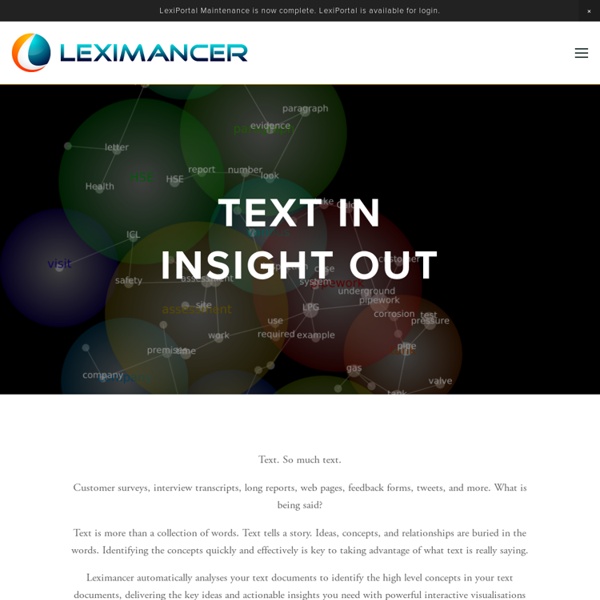



PNNL: IN-SPIRE™ - Home NodeXL The simplest, easiest way to get insights into networks, try the free and open NodeXL! Network Overview Discovery and Exploration for Excel 2007/2010/2013 NodeXL provides support for social network analysis in the context of a spreadsheet. See: NodeXL is a project from the Social Media Research Foundation and is a collaboration among: NodeXL is the free and open add-in for Excel that supports network overview, discovery and exploration. NodeXL requires Office 2007, 2010 or 2013. A video tutorial for NodeXL can be found at: A book Analyzing Social Media Networks with NodeXL: Insights from a connected world is available from Morgan-Kaufmann: Analyzing Social Media Networks with NodeXL: Insights from a Connected World Supporting documentation can be found at Data sets and other teaching materials are available at Social Media Research Related Publications
Visual Literacy: An E-Learning Tutorial on Visualization for Communication, Engineering and Business Visual Cards for Collaboration and Team Creativity Making the Complex Clear Visual Literacy for Managers - How Sketching enables Visual Problem Solving and Communication (get the hardcopy edition at sketchingatwork.com) By clicking on a map or diagram thumbnail below, you can access an interactive graphic overview on tools, books, researchers in different visualization fields, as well as on key success factors of visualization. There is also an interactive organizing table that shows (incl. examples) one hundred visualization-based methods. Clicking on a particular tool, book, person, document, principle or method within a map opens the respective website or homepage in a new browser window or reveals an example (most maps were created with lets-focus). Stairs to visual excellence "Towards A Periodic Table of Visualization Methods for Management"Lengler R., Eppler M. (2007). Version 1.5 of the periodic table as PDF Imperfect Storm (Click on image to enlarge)
Visualize any Text as a Network - Textexture Knowledge management Knowledge management (KM) is the process of capturing, developing, sharing, and effectively using organizational knowledge.[1] It refers to a multi-disciplined approach to achieving organisational objectives by making the best use of knowledge.[2] An established discipline since 1991 (see Nonaka 1991), KM includes courses taught in the fields of business administration, information systems, management, and library and information sciences.[3][4] More recently, other fields have started contributing to KM research; these include information and media, computer science, public health, and public policy.[5] Columbia University and Kent State University offer dedicated Master of Science degrees in Knowledge Management.[6][7][8] History[edit] In 1999, the term personal knowledge management was introduced; it refers to the management of knowledge at the individual level.[14] Research[edit] Dimensions[edit] The Knowledge Spiral as described by Nonaka & Takeuchi. Strategies[edit] Motivations[edit]
Tagxedo - Word Cloud with Styles The Theory of Knowledge The Theory of Knowledge The Theory of KnowledgeWhat is Scientific Method?Limits of EmpiricismPrejudice Against DialecticsStalinist Caricature "It is the customary fate of new truths to begin as heresies and to end as superstitions." (T. H. The basic assumption underlying all science and rational thought in general is that the physical world exists, and that it is possible to understand the laws governing objective reality. "Indeed, it’s hard to imagine how science could exist if they didn’t. The same is true of the human race in general. It is the illusion of every epoch that it represents the ultimate peak of all human achievements and wisdom. The history of science shows how economical the human mind is. As Eric J. The development of science proceeds through an infinite series of successive approximations. "The first discoveries were realisation that each change of scale brought new phenomena and new kinds of behaviour. Should we therefore despair of ever achieving the whole truth?
Aristotle Aristotle's views on physical science profoundly shaped medieval scholarship. Their influence extended into the Renaissance and were not replaced systematically until the Enlightenment and theories such as classical mechanics. Some of Aristotle's zoological observations, such as on the hectocotyl (reproductive) arm of the octopus, were not confirmed or refuted until the 19th century. His works contain the earliest known formal study of logic, which was incorporated in the late 19th century into modern formal logic. His ethics, though always influential, gained renewed interest with the modern advent of virtue ethics. The sum of his work's influence often ranks him among the world's top personalities of all time with the greatest influence, along with his teacher Plato, and his pupil Alexander the Great.[9][10] Life At about the age of eighteen, Aristotle moved to Athens to continue his education at Plato's Academy. Aristotle was appointed as the head of the royal academy of Macedon. Logic